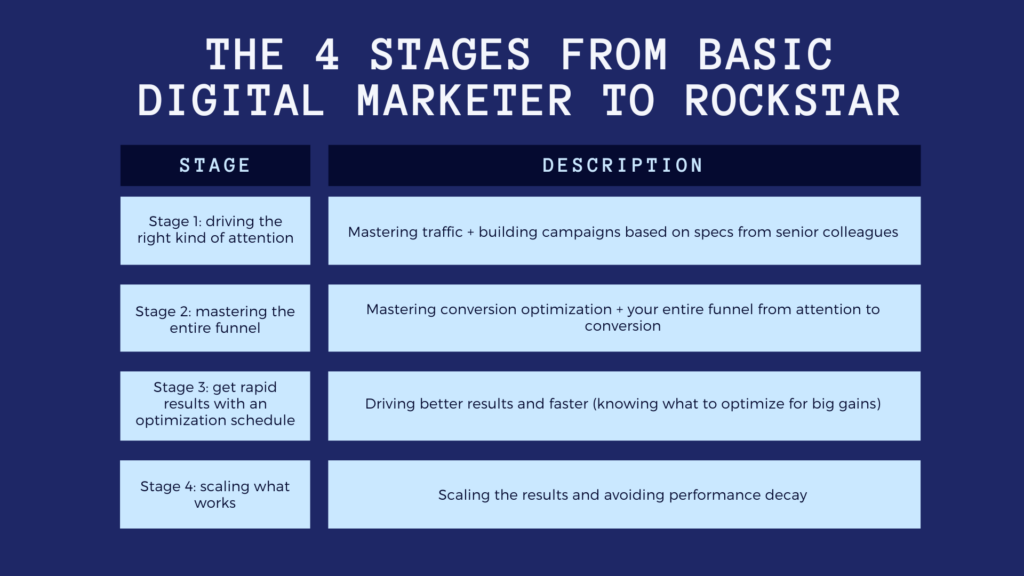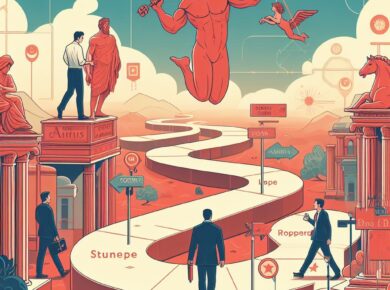When I started this journey, the first thing I wondered was how to become a good digital marketer and what that would look like.
I imagined someone being able to sell any product to anyone, like some superhero salesman on the internet.
In hindsight, that turned out to be more of a pipedream than an achievable goal as each product comes with its own issues, like a missing product-market fit or extremely strict branding guidelines hindering your creativity.
Being a good digital marketer (and what makes one) is surprisingly challenging to get specific on when the purpose is to become one ourselves.
In this article, I’ll explore what makes a great digital marketer and give you an overview of what that can look like, so you can work to become one if that’s your ambition.
Let’s dive in.
Table of Contents
The often overlooked trait that makes a good marketer
In football, you tend to know who the best goal scorer is. In music, the best guitar players, and in business, who built the biggest company in the free market…
But in marketing, there’s no scoreboard.
Heck most of us can’t even agree on what marketing really is, let alone how the best are different from the rest.
Does it come down to winning the most awards? Creating brilliant ad campaigns like Don Draper?

Many of us seem to think that marketing is synonymous with advertising. Seth Godin, a legend in the field, suggests that it’s the truth, but not the entire truth. Promotion is just one part of telling a story about the brand.
Another legend in the field, E. Jerome McCarthy, came up with the “4Ps” theory often taught in marketing degrees. It hints at something similar as he breaks marketing down into promotion, product, pricing, and placement.
The way they talk about good marketing makes it sound as if it’s glue flowing through the company combining everything, rather than just the spammy ads we are used to these days.
It feels almost as if marketing is to businesses what charisma is to humans: that odd quality we know when we see it, but we can’t seem to pinpoint.
If marketing is indeed that “glue”, that begs the question: what makes a great “glue maker”? What makes a great marketer?
When you ask marketers themselves, you’ll inevitably get stuck with an answer like “one who provides the most value…” That word “value” is vague enough to set off anyone’s bullshit detector, even if it’s true.
Many companies tend to look at great marketing as something that brings home the bacon, which suggests that a great marketer is someone who increases sales at scale by giving more of that “value” to customers.
The big issue is that there’s no way to attribute an increase in sales back to marketing with certainty. It has been THE issue since the dawn of the marketing discipline and I’m not going to pretend like I’ve outsmarted everyone and found a solution.
There are plenty of faulty proxy metrics attempting to measure it, but they all suck and we know it.
But to level up your career, we still need to figure out what makes a great marketer so we can work backward and figure out what to improve. I’ll attempt to answer this based on the assumption that it means to give people what they want. The value (whatever that represents) to each individual in our target audience.
To figure out how we can give them what they want, we need to understand three things:
- What our target group wants
- What our products help them with
- How we can bridge the gap between those two points
Many of us tend to focus too much on what our products can do and why we are the best. Perhaps that’s why almost every product you buy feels underwhelming; marketers oversold them and left no chance for the product to delight you.
At the same time, we tend to ignore deeply understanding the target group. That’s a shame as it’s among the most powerful things we can do when it comes to producing successful marketing campaigns.
Imagine trying to give a friend a gift without knowing what they care about. The chances they’ll get something they care about as opposed to what we care about is slim.
Like an actor, we have to become the audience and set aside our biases to think like they do about our product. We tend to get the best results by tapping into their mind, what they already think and working backward from there, rather than hoping they will bother with our crazy ideas enough to pull out their wallet.
To me, that makes understanding the target group the most important item in marketing. Not because the other points aren’t important but because we focus too much on our products, and overlook those who are going to buy them.
If we continue down the rabbit hole for a moment, that means empathy is the most important skill to master in traditional marketing. The skill of putting yourself in your target group’s place.
Even so, we still end up coming back to the same issue: it’s damn hard to know that a marketing campaign increased sales with certainty.
That is why businesses have come to love digital marketing. It replaces the old-school direct mail marketing along with its tracking capabilities. In the darkness of the unknown, any tracking that can shed light on things becomes sexy as hell.
With the tricky fundamentals of what makes a good traditional marketer out of the way, let’s dive into the matter at hand: how to be a good digital marketer.
How to be a good digital marketer (and recognize a rockstar)
Besides bridging the gap between your products and target audience with persuasion, digital marketers tend to balance that with media buying (or earned media) expertise.
In traditional marketing, that used to be multiple roles, but in digital marketing they are often merged into one.
To that comes the technical aspect of digital like building funnels with landing pages across several channels such as blogs and email, and tracking everything that’s going on.
At least we’ve got the miracle of tracking.
But it turns out that tracking isn’t as practical and effective as it’s made out to be. If you’ve ever tried tracking users from a website to an app, you know the struggle.
Heck, try tracking what convinced your friend to buy their brand-new sneakers.
Was it that Kanye wore wearing them? That another friend recommended them? The Facebook ad that claimed the conversion in your campaign, but may have just been the order taker?
The basics are nearly impossible to figure out in the real world, let alone attempt to build a digital tracking model on top of it.
We humans are a funny bunch. We’d rather have a messed up tracking system that doesn’t work and misleads us than stay in the unknown.
That’s a lot to master to become a good digital marketer, but fortunately, you don’t need to know it all at once (more on that in a minute).
The difference between your typical digital marketer and a rockstar is that the former builds campaigns based on specs, whereas the latter knows enough about all the tools and the target audience to set the specs for a successful campaign.
That’s not to say that campaigns are successful right off the bat. That’s rare and this is where the rockstar digital marketer really shines. They know how to optimize their campaigns to deliver results.
That means understanding things like how impactful different elements of persuasion are compared to, say, shiny new content formats like carousel ads or chatbots. Google and Facebook are great at distributing your message but they aren’t miracle tools that can magically turn something no one cares about into gold.
Now that we have a better sense of the difference between your average digital marketer and a rockstar, let’s look at how to be a good digital marketer.
The transformation: 4 stages to become a GOOD digital marketer
There are many ways to progress through your digital marketing career and if you’ve been following a different path, don’t feel like you have to go back and start over.
The stages I’m suggesting here are based on my experience of difficulty and what’s easiest to get results with at first, but it’s not a perfect outline. Take it with a grain of salt.

Let’s jump in!
Stage 1: driving the right kind of attention
I’ve found it to be easiest to start out by learning how to drive quality traffic through one channel, such as organic traffic from Youtube or running Facebook ads.
Organic traffic tends to be ranking content in search engines or getting shared so that it funnels the right people back to your site. For paid ads that’s buying access to the right audience at a good CPM.
This is where most junior specialists find themselves. You’re able to build digital marketing campaigns based on specs and make sure you’re tracking and reporting correctly.
You’ll likely be able to optimize them based on requirements, but without knowing clearly why something is prioritized over something else to the point where you can replicate the results on your own with different products and campaigns.
Stage 2: mastering the entire funnel
When you’ve mastered getting the right type of attention for your product, you’ll move on to figuring out how the traffic you’re sending is converting throughout the entire funnel.
Even if you’ve prepared reports on this before, that isn’t the same as understanding why there are drop-offs at each step of the funnel, what’s causing them, and which issues will make the biggest impact when you fix them.
For example, would users click the ad or blog post expecting one thing, but when arriving on the landing page, see something different? How is the landing page conversion rate affected when you test new traffic?
On one hand, this stage is more about persuasion, psychology, and copywriting to guide users through your funnel, but that’s just one part of it.
There’s also the technical side covering things like making sure your landing page is coherent across devices while loading fast enough to avoid dropping users.
At this stage, you’re mastering your entire funnel from end to end and how its elements play together.
Stage 3: get faster results with an optimization schedule
When you’ve mastered the whole funnel you were tasked with driving traffic to at first, you’ve probably gotten a better sense of how the different elements impact your conversions.
You’ll have a better sense of which ones appear important, but don’t really move the needle. Next, you’re building an optimization schedule to improve them in a systematic fashion.
You’ll usually find that just a few different elements have a major impact on the performance of your funnel, so you’re better off testing more creatives around those than everything else.
Once you feel fully confident in the entire digital sales funnel, you’ll be able to examine a funnel for a similar product and create a set of A/B tests to optimize the campaign and hit your targets regularly.
You might not know which of your ideas in an A/B test will win, but you’ll know what to test in order to work your way to the results systematically.
You’ll also have a better sense of when new creative ideas are so similar to your existing ones that they won’t make a difference and just waste your time if you test them. This will make you look good as you’ll get results faster.
For example, you might find that optimizing the CTA button on your landing page doesn’t really improve your conversions that much compared to the headline. So when you’re putting together your optimization schedule, you might only test two CTA button variations but twenty different headlines.
I fell into the trap of thinking everything should be tested, and that, with a million different variations. Don’t waste your time as they don’t carry even weight.
This requires basic math skills to forecast what will happen when you optimize certain elements and a sense of what good vs. average numbers look like for each metric throughout your funnel (i.e. what is a good CTR, landing page CVR, etc.)
This (senior) stage is where most digital marketers struggle and where you can really make a difference. Your optimization schedule has to run like a well-oiled factory machine to avoid wasting time and money testing your way to results.
You’ll find that this might require you to work on your interpersonal skills as you’ll have to persuade the creative team to deliver more variations than they might want to in the first place.
But optimizing the right stuff will allow you to show your boss meaningful improvements in record time.
Stage 4: scaling what works to become a good digital marketer
Finally, at the last level, there’s scaling your campaigns when you’re happy with the results of your funnel.
There are loads of ways to scale, like:
- Getting more traffic from your existing traffic source
- Going to new traffic sources or channels to get more of the same target group
- Expanding to new audiences having the same problem
- Expand to different languages
- Finding more use cases that your products solve for the same or different target groups
But the more we scale, the more we have to worry about the campaign’s lifespan getting shorter as the performance decays. It’ll go faster and faster the bigger the scale.
That means planning for it to happen and rolling out new fresh creatives regularly. Often some that aren’t so different that they kill the performance but different enough that your campaign stays fresh. It’s a fine line to walk.
In this, also comes judging the quality of the traffic you’re getting. That is tricky business but is something that can lift your entire campaign or kill its performance without any clear indication in your funnel dashboard.
Some marketers choose to do this via A/B testing while others prefer to do customer research by speaking to people. I’ve found a balance between the two to be the most effective.
While we can’t always learn skills by perfectly following a roadmap like this, mastering all of these skills is the essence of how to become a good digital marketer.
Takeaways
- Understanding your target group is among the most important tools to do good marketing online and is often overlooked
- Systematically testing your way to results and knowing the impact each funnel element has on your conversions is critical if you want to deliver results quickly and look good at work
- The skills are mostly the same, no matter which roadmap or stages we follow


